 Petzlover
Petzlover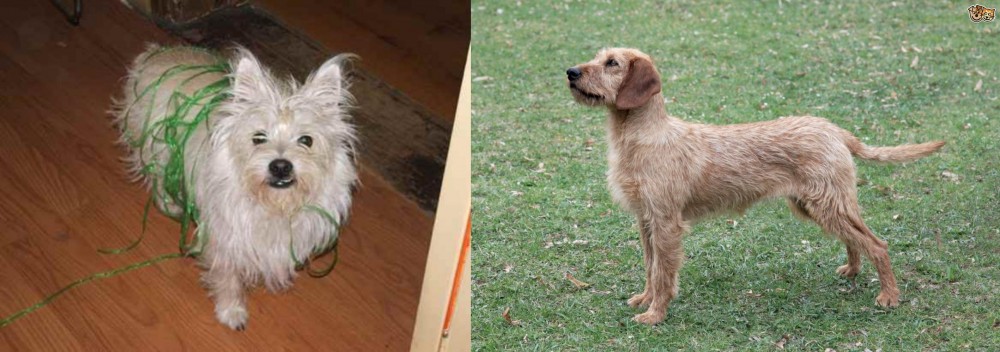 Cairland Terrier is originated from United Kingdom but Styrian Coarse Haired Hound is originated from Austria. Cairland Terrier may grow 20 cm / 7 inches shorter than Styrian Coarse Haired Hound. Cairland Terrier may weigh 10 kg / 22 pounds lesser than Styrian Coarse Haired Hound. Cairland Terrier may live 3 years more than Styrian Coarse Haired Hound. Cairland Terrier may have more litter size than Styrian Coarse Haired Hound. Cairland Terrier requires Low Maintenance. But Styrian Coarse Haired Hound requires High Maintenance
Cairland Terrier is originated from United Kingdom but Styrian Coarse Haired Hound is originated from Austria. Cairland Terrier may grow 20 cm / 7 inches shorter than Styrian Coarse Haired Hound. Cairland Terrier may weigh 10 kg / 22 pounds lesser than Styrian Coarse Haired Hound. Cairland Terrier may live 3 years more than Styrian Coarse Haired Hound. Cairland Terrier may have more litter size than Styrian Coarse Haired Hound. Cairland Terrier requires Low Maintenance. But Styrian Coarse Haired Hound requires High Maintenance
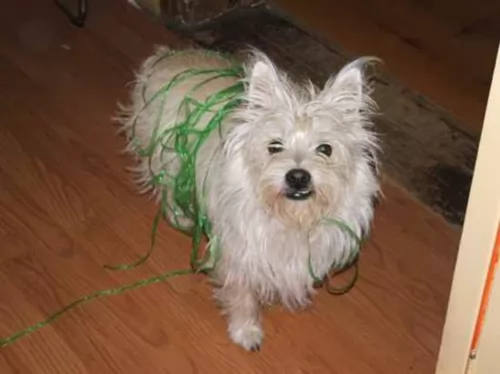 The Cairland Terrier is a cross between the Cairn Terrier and the West Highland White Terrier. It simply means that if you own a Cairland, you’re going to get a little bit of each dog in him.
The Cairland Terrier is a cross between the Cairn Terrier and the West Highland White Terrier. It simply means that if you own a Cairland, you’re going to get a little bit of each dog in him.
This hybrid is a new breed which means you’re not going to get too much documented history on the dog. A tough little hunter of fox and otter, the Cairnland is thought to hail from Scotland.
 The Styrian Coarse Haired Hound is a German hound, a medium sized breed that was found to originate in Styria in Austria. It was bred to be a boar hunting scent hound in the mountains. The breed is an Austrian Bracke and one of the largest. In the 1870’s the breed was developed by Karl Peintinger to get a hardy, rough coated hunting dog. Peintinger took the Istrian Hound and an old type scent hound of Hanoverian and continued selective breeding until he got the dog he wanted.
The Styrian Coarse Haired Hound is a German hound, a medium sized breed that was found to originate in Styria in Austria. It was bred to be a boar hunting scent hound in the mountains. The breed is an Austrian Bracke and one of the largest. In the 1870’s the breed was developed by Karl Peintinger to get a hardy, rough coated hunting dog. Peintinger took the Istrian Hound and an old type scent hound of Hanoverian and continued selective breeding until he got the dog he wanted.
The breed is still used to hunt boar and track wounded animals. They work in high altitudes and rough terrains. They were not created to be companion animals and most of them are still working dogs. They do not make great house or family pets. Because of these circumstances, the breed is rare today.
Sometimes you will see the breed called the Peintinger Bracke after its developer. The Austrian Kennel Club recognized the breed in 1889 and the Federation Cynologique Internationale as a scent hound. The Styrian Coarse Haired Hounds were next recognized in 2006 by the United Kennel Club in North America, but not the AKC – American Kennel Club. There are many smaller kennel clubs and organizations for the breed as well many hunting clubs.
As mentioned, the breed is the largest of the Austrian Brackes. They are one of the three breeds included in the Grand Brackes. The name comes from the fact that all these dogs were developed for hunting in the Austrian mountains. They are pretty much unknown in the rest of the world. They thrive in the harsh climates of the Austrian mountains.
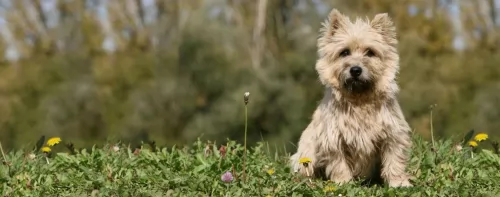 The Cairland Terrier is a small dog standing anything between 20 and 35cm in height and weighing in at roughly 4 to 10kg. He has short legs, a compact little body, while being muscled and strong. He has small erect ears with a shortish upright tail.
The Cairland Terrier is a small dog standing anything between 20 and 35cm in height and weighing in at roughly 4 to 10kg. He has short legs, a compact little body, while being muscled and strong. He has small erect ears with a shortish upright tail.
The color of the medium length coat can be fairly varied which means brown, black, cream, fawn, brindle or even white from the Westie. The dog has two coats with the topcoat being fairly harsh, coarse and straight to slightly wavy while the undercoat is soft.
When it comes to temperament, the Cairland Terrier is social and feisty with a high self-esteem. He has a strong personality and can be somewhat stubborn but he is a great friend of children in the home. He just loves to take part in all their games.
With training and socialization which he undergoes easily, he will get on well with other pets too, although he can become aggressive with other dogs in his territory.
 The Styrian Coarse haired Hound is well muscled, medium sized and lithe. They run easily on all types and levels of terrain. Their coat is rough and harsh, giving the breed part of its name. They can tolerate both extremes of the climate temperatures. They are strong and confident dogs wearing a very serious facial expression. These guys are all about the job – the hunt. Their prey drive is extremely high.
The Styrian Coarse haired Hound is well muscled, medium sized and lithe. They run easily on all types and levels of terrain. Their coat is rough and harsh, giving the breed part of its name. They can tolerate both extremes of the climate temperatures. They are strong and confident dogs wearing a very serious facial expression. These guys are all about the job – the hunt. Their prey drive is extremely high.
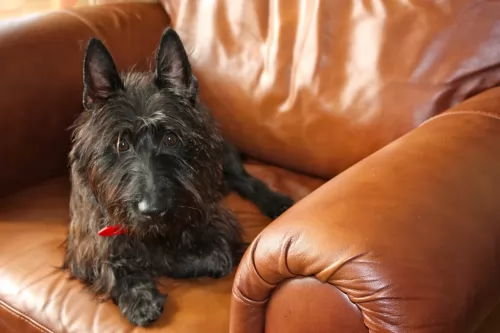 Terriers are dogs that are full of character and self-confidence, and your Cairland Terrier is no different. These small dogs in the Terrier group don’t actively look for a fight with other dogs, but if they are provoked, they aren’t intimidated and will give bigger dogs a piece of their mind. They make splendid pets and will always be ready for a game.
Terriers are dogs that are full of character and self-confidence, and your Cairland Terrier is no different. These small dogs in the Terrier group don’t actively look for a fight with other dogs, but if they are provoked, they aren’t intimidated and will give bigger dogs a piece of their mind. They make splendid pets and will always be ready for a game.
Make sure that your Cairland Terrier remains the feisty little character he is by making sure he gets well looked after. Dogs aren’t known as man’s best friend for nothing, and in exchange for the care you give your Terrier, you’ll be rewarded by a loyal and devoted friend.
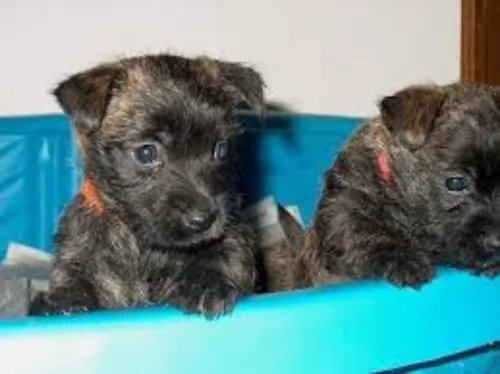 Your Cairland is a tough, feisty little dog and you’re not going to find yourself constantly having to take him to the vet. However even healthy dogs can be affected by ill health, and we look at a couple of illness you want to watch for with your Terrier.
Your Cairland is a tough, feisty little dog and you’re not going to find yourself constantly having to take him to the vet. However even healthy dogs can be affected by ill health, and we look at a couple of illness you want to watch for with your Terrier.
This can be brought on by a change in diet. Usually you can keep food away from your pet for 24 hours, allowing the stomach to empty and to settle. However, if there is blood in the diarrhoea or your dog is vomiting, then veterinary advice must be sought.
Just like humans, a dog can have an allergy to pollen where you see watering of the eyes as well as sneezing. This is because of inflammation of the mucous membranes in the nose. Your vet can ease the problem for your pet.
 The breed is fairly healthy and isolated from crossbreeding. They are susceptible to several major conditions.
The breed is fairly healthy and isolated from crossbreeding. They are susceptible to several major conditions.
• PRA or Progressive Retinal Atrophy = a group of degenerative, genetic eye diseases the cause blindness over time.
• Bloat – most large dogs suffer from this and not so much a medium breed like this one, but it is a condition that their energy levels and work ethics could lead to. Fatal if not treated immediately.
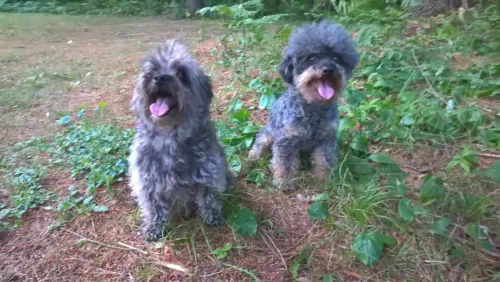 Because the Cairland Terrier is a hybrid breed, the coat can be wiry or soft, but it’s a low maintenance coat. He will need to be brushed twice a week. Some people take their Cairland to have the coat professionally trimmed while others buy a special stripping tool and they strip the hair a couple of times a year.
Because the Cairland Terrier is a hybrid breed, the coat can be wiry or soft, but it’s a low maintenance coat. He will need to be brushed twice a week. Some people take their Cairland to have the coat professionally trimmed while others buy a special stripping tool and they strip the hair a couple of times a year.
Small dogs are prone to dental disease, so you will need to brush your Cairland’s teeth at least two or three times a week. Dental disease is a serious problem with dogs and it won’t only affect the teeth and gums but it can result in infection which can contribute to organ failure. Periodontal disease is always a big problem with little dogs. If you’re not sure how to go about looking after your dog’s teeth, you can always take your dog to the vet for dental check-ups and cleaning.
 1Feeding the puppy – Feed this very active breed a high quality dog food for medium sized dogs. Feed puppies 3-4 times a day a total of ¾ to 1 cup.
1Feeding the puppy – Feed this very active breed a high quality dog food for medium sized dogs. Feed puppies 3-4 times a day a total of ¾ to 1 cup.
2.Feeding the adult - feed this very active breed a high quality, high protein diet. Feed the adult 1-2 times a day a total of 1.6 cups of dry food.
4. Games and Exercises They are energetic, athletic and extremely agile. They are muscular and lithe and need a lot of exercise. The is a dog that can travel across rough terrain for hours at a time. They are tenacious hunters and need an outlet for that prey drive.
They need space and time to run. A large yard is great because you don’t want to take them to a dog park. Give them a lot of toys and puzzles. They excel at lure coursing, field trials and hunting trials. Their sense of smell makes them great at nose work and they like agility, tracking and rally obedience.